Books We Loved, Mar. 2024
- Five Directions Press

- Mar 15, 2024
- 4 min read
Not sure how we got to mid-March already, but temperatures are rising, there are hints of daffodils on the hill, and spring is clearly in the air—and in fact, just one week away. So to celebrate, here is the monthly wrap-up of Books We Loved: two historical novels and one contemporary but with a historical subplot. Read on to find out more.

Ruth Reichl, Delicious! (Random House, 2014)
Most people know Ruth Reichl as a food writer and restaurant critic, but her multitalented career includes this delightful—and, yes, delicious!—novel.
Billie Breslin, a young would-be reporter who has left her home in California for New York City, gets a job as editorial assistant at Delicious!, a well-established food magazine that soon goes out of business. Billie, tasked with staying on when everyone else leaves, alternates between dealing with phone calls from disgruntled customers and searching for a long-ago correspondence between a tween, then teenage girl and the famous chef James Beard. On the weekends, she helps out at an Italian deli, where she quickly becomes part of the owner’s family while sparring with a customer she dubs “Mr. Complainer.” Meanwhile, the issues that have separated Billie from her own family and driven her to New York gradually come to light.
The use of food in this novel is extraordinary. It goes far beyond the usual dimensions: an indicator of social status, a way to mark the passage of time, a set of actions to fill in the background, and more. The sensory experience conveyed by Billie’s immersion in the taste and texture of the foods she consumes pulls the reader into the story, revealing and molding character, expressing emotion, even influencing the way characters relate to one another. Billie has the taste equivalent of perfect pitch, and it’s a delight to follow her culinary adventures.
The book is also just a wonderful read. I tore through its 420 pages in three and a half evenings. And don’t miss Reichl’s second foray into fiction, The Paris Novel, due out on April 23, 2024. It, too, is a gem.—CPL

Daniel Mason, The Winter Soldier (Little Brown, 2018)
Lucius Krzelewski is an earnest young medical student in Vienna when World War I breaks out. Though he has not yet learned the art of surgery, his head is full of romantic notions of heroic battlefield healings, and in the belief that he will be placed in a functioning hospital setting, he enlists. But when he finally reaches the station he has been directed to, he finds himself in a freezing cold, bombed-out church in the Carpathian Mountains where patients are dying of typhus, surgical thread comes from the clothing of those no longer needing it, and the person in charge is a rifle-carrying nun, aided by a handful of orderlies who would be considered misfits in any other setting.
With medical supplies lacking, and more and more wounded men being brought in all the time, Lucius learns the most rudimentary surgical techniques at Sister Margarete’s side. These often include life-saving amputations. Author Daniel Mason is a trained physician, and his descriptions are quite graphic, but they have the power of really bringing home both the horrors of war and the fierce determination of the people working to heal its victims. Sister Margarete is hell-bent on saving as many lives as possible, her doggedness equal only to her tender bedside manner, and it doesn’t take very long until Lucius realizes he is falling in love with her. But she is a nun, or is she?
At the heart of this wonderful, gripping, powerful epic tale is the arrival of an unconscious soldier dragged in from the snow wearing a coat lined with drawings. Not only is he suffering physically, but he shows himself to be suffering mentally too, a response to war that was thought of as cowardice in those times. Lucius, who has become interested in the psychological effects of war, is convinced he can help “the winter soldier.” In his effort to do so, he unwittingly upsets the balance of Sister Margarete’s medical camp—and changes the trajectory of his post-war future as well.
This is a book you can live in the whole time you’re reading it—and it will linger afterwards too. The attention to detail—the war, the landscape, the history—is meticulous. The characters are unforgettable—especially Sister Margarete—and their various relationships shape a most intriguing plot.—JS

Deanna Raybourn, A Grave Robbery (Berkley, 2024)
This series featuring the lepidopterist Veronica Speedwell and her partner (in every sense of the word)—the taxonomist Revelstoke Templeton-Vane, known as Stoker—is an utter delight. There are mysteries, sure, but there is also a great deal of humor, and I no sooner finish one than I long for the next.
The latest installment opens with a golden marmoset that has developed a crush on Stoker and consequent jealousy of Veronica, who returns the animal’s dislike in full measure. Their eccentric boss, Lord Rosemorran, has already filled his own estate to the brim with curiosities of all sorts, and in chapter 1 it becomes clear that he has additional items stashed in various London warehouses, which Veronica and Stoker will one day be charged with cataloguing (assuming they can ever make their way through the existing collection).
One such item is a wax statue of a young woman in medieval dress, and Lord Rosemorran’s irrepressible youngest daughter, Lady Rose (who shares the marmoset’s sentiments about Stoker and Veronica), demands that Stoker insert a mechanism in the wax statue that will make it appear to breathe. This is clearly a setup for a mystery to come, but I won’t say anymore—why spoil the fun?—CPL




Comments